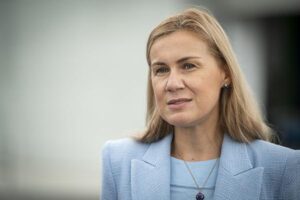Kadri Simson, the European Commissioner for Energy, delivered a speech for European Biomethane Week on 25 October, in which she said that biomethane's role in Europe's energy transition is "even more critical" now than one year ago.
Delivering a keynote speech at the European Biogas Association's 2023 Conference at The EGG Centre in Brussels, Simson said that the EU is still importing between 40-45 bcm of Russian gas, "so let's try to replace this as much as possible with biomethane".
Biomethane is a solution that is available right now, and "our energy independence and the security of our energy supply now depends" on the use of utilising domestic resources in a sustainable and circular way.
Noting that the volatility of energy and gas prices make the business case for biogas and biomethane production even more compelling, she observed that commercial technologies and good practices in the value chain are already well-developed.
However, there is a lot of scope to do more to achieve the target of 35 bcm EU annual production target by 2030.
One year after the announcement of the Biomethane Industrial Partnership, she said there have been positive exchanges between industry and policymakers at both national and EU level.
"This has helped Member States to identify national biomethane targets and develop strategies and measures in their National Energy and Climate plans," according to Simson.
Without work with Member States, the right policy environment to de-risk and incentivise biometane investment cannot be created.
Simson said she had written to every Energy Minister to inform them of the Biomethane Industrial Partnership, and to share biomethane country fiches.
Each fiche assesses the current level of biogas and biomethane production with identified sustainable biomethane potential in respective Member States.
They have been published to encourage and support further cooperation between Member States and industry stakeholders, also in light of the ongoing process to update National Energy and Climate Plans.
Simson noted there is a group of Member States that exemplify good practices: "They are developing policies on biomethane as a renewable source with cross-sectoral benefits and framing a positive legal framework for sustainable biomethane production and use."
She added that progress has been made on "some of the other complementary work" under the Action Plan on biomethane, especially on improving the permitting process.
"We're also closer to a common ground among Member States on a harmonised gas standard that would remove technical barriers, ensuring the safe flow of biomethane in the integrated EU grid," she added.
The way ahead
Simson said a clear pathway needs to be set towards the 35 bcm of biomethane objective.
"I am open to seeing with Council and Parliament how best we can further our objective within the upcoming Hydrogen and Gas Decarbonisation Package," she said.
"Second, we need to continue to share best practices across all EU Member States. We have well-developed commercial technologies and business models, but they are not widespread enough.
"And third, I'm convinced that further integrating the findings of the biomethane partnership into our policy, specifically at national and regional level, will create the right conditions to attract the necessary investments," she said.
She reiterated that Europe is determined to lead the transition to renewable gases and to decarbonise the gas market by 2050.
"We have made tremendous progress, but more is needed. It's crucial that we continue to work together – policymakers and industry, Member States and EU – to turn the opportunity into reality," she concluded.
EU Commissioner for Energy delivers EBA Conference keynote



























